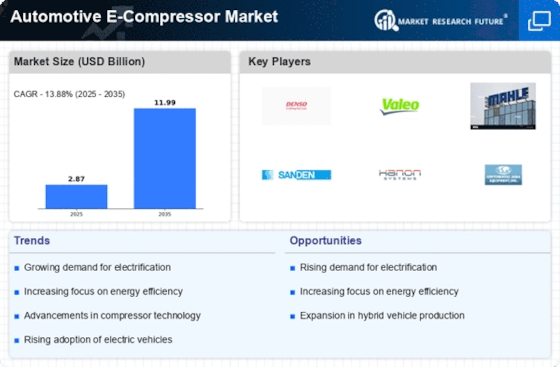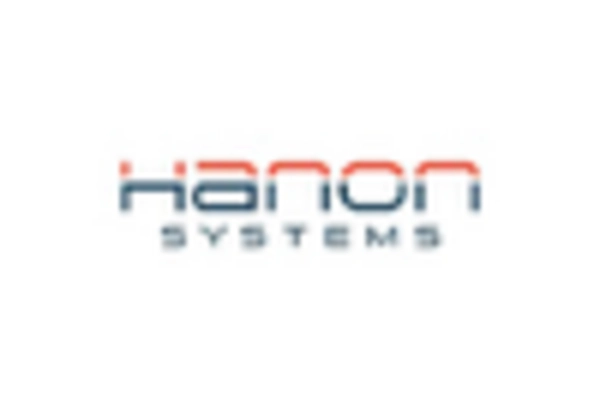-
EXECUTIVE SUMMARY
-
Market Overview
-
Key Findings
-
Market Segmentation
-
Competitive Landscape
-
Challenges and Opportunities
-
Future Outlook
-
MARKET INTRODUCTION
-
Definition
-
Scope of the study
- Research Objective
- Assumption
- Limitations
-
RESEARCH METHODOLOGY
-
Overview
-
Data Mining
-
Secondary Research
-
Primary Research
- Primary Interviews and Information Gathering Process
- Breakdown of Primary Respondents
-
Forecasting Model
-
Market Size Estimation
- Bottom-Up Approach
- Top-Down Approach
-
Data Triangulation
-
Validation
-
MARKET DYNAMICS
-
Overview
-
Drivers
-
Restraints
-
Opportunities
-
MARKET FACTOR ANALYSIS
-
Value chain Analysis
-
Porter's Five Forces Analysis
- Bargaining Power of Suppliers
- Bargaining Power of Buyers
- Threat of New Entrants
- Threat of Substitutes
- Intensity of Rivalry
-
COVID-19 Impact Analysis
- Market Impact Analysis
- Regional Impact
- Opportunity and Threat Analysis
-
AUTOMOTIVE E-COMPRESSOR MARKET, BY APPLICATION (USD BILLION)
-
Air Conditioning Systems
-
Refrigeration Systems
-
Thermal Management Systems
-
Electric Vehicle Heating Systems
-
AUTOMOTIVE E-COMPRESSOR MARKET, BY TYPE (USD BILLION)
-
Scroll E-Compressor
-
Rotary E-Compressor
-
Piston E-Compressor
-
AUTOMOTIVE E-COMPRESSOR MARKET, BY COOLING CAPACITY (USD BILLION)
-
Below 5kW
-
5kW to 10kW
-
Above 10kW
-
AUTOMOTIVE E-COMPRESSOR MARKET, BY END USE (USD BILLION)
-
Passenger Vehicles
-
Commercial Vehicles
-
Electric Vehicles
-
AUTOMOTIVE E-COMPRESSOR MARKET, BY REGIONAL (USD BILLION)
-
North America
- US
- Canada
-
Europe
- Germany
- UK
- France
- Russia
- Italy
- Spain
- Rest of Europe
-
APAC
- China
- India
- Japan
- South Korea
- Malaysia
- Thailand
- Indonesia
- Rest of APAC
-
South America
- Brazil
- Mexico
- Argentina
- Rest of South America
-
MEA
- GCC Countries
- South Africa
- Rest of MEA
-
COMPETITIVE LANDSCAPE
-
Overview
-
Competitive Analysis
-
Market share Analysis
-
Major Growth Strategy in the Automotive E-Compressor Market
-
Competitive Benchmarking
-
Leading Players in Terms of Number of Developments in the Automotive E-Compressor Market
-
Key developments and growth strategies
- New Product Launch/Service Deployment
- Merger & Acquisitions
- Joint Ventures
-
Major Players Financial Matrix
- Sales and Operating Income
- Major Players R&D Expenditure. 2023
-
COMPANY PROFILES
-
Denso
- Financial Overview
- Products Offered
- Key Developments
- SWOT Analysis
- Key Strategies
-
Mahle
- Financial Overview
- Products Offered
- Key Developments
- SWOT Analysis
- Key Strategies
-
Continental
- Financial Overview
- Products Offered
- Key Developments
- SWOT Analysis
- Key Strategies
-
Johnson Electric
- Financial Overview
- Products Offered
- Key Developments
- SWOT Analysis
- Key Strategies
-
Boge Rubber and Plastics
- Financial Overview
- Products Offered
- Key Developments
- SWOT Analysis
- Key Strategies
-
Valeo
- Financial Overview
- Products Offered
- Key Developments
- SWOT Analysis
- Key Strategies
-
Sanden Corporation
- Financial Overview
- Products Offered
- Key Developments
- SWOT Analysis
- Key Strategies
-
Toshiba
- Financial Overview
- Products Offered
- Key Developments
- SWOT Analysis
- Key Strategies
-
Shenghuachuangqi
- Financial Overview
- Products Offered
- Key Developments
- SWOT Analysis
- Key Strategies
-
Hella
- Financial Overview
- Products Offered
- Key Developments
- SWOT Analysis
- Key Strategies
-
Calsonic Kansei
- Financial Overview
- Products Offered
- Key Developments
- SWOT Analysis
- Key Strategies
-
Showa Corporation
- Financial Overview
- Products Offered
- Key Developments
- SWOT Analysis
- Key Strategies
-
Hanon Systems
- Financial Overview
- Products Offered
- Key Developments
- SWOT Analysis
- Key Strategies
-
Mitsubishi Electric
- Financial Overview
- Products Offered
- Key Developments
- SWOT Analysis
- Key Strategies
-
APPENDIX
-
References
-
Related Reports
-
LIST OF TABLES
-
LIST OF ASSUMPTIONS
-
NORTH AMERICA AUTOMOTIVE E-COMPRESSOR MARKET SIZE ESTIMATES & FORECAST, BY APPLICATION, 2019-2035 (USD BILLIONS)
-
NORTH AMERICA AUTOMOTIVE E-COMPRESSOR MARKET SIZE ESTIMATES & FORECAST, BY TYPE, 2019-2035 (USD BILLIONS)
-
NORTH AMERICA AUTOMOTIVE E-COMPRESSOR MARKET SIZE ESTIMATES & FORECAST, BY COOLING CAPACITY, 2019-2035 (USD BILLIONS)
-
NORTH AMERICA AUTOMOTIVE E-COMPRESSOR MARKET SIZE ESTIMATES & FORECAST, BY END USE, 2019-2035 (USD BILLIONS)
-
NORTH AMERICA AUTOMOTIVE E-COMPRESSOR MARKET SIZE ESTIMATES & FORECAST, BY REGIONAL, 2019-2035 (USD BILLIONS)
-
US AUTOMOTIVE E-COMPRESSOR MARKET SIZE ESTIMATES & FORECAST, BY APPLICATION, 2019-2035 (USD BILLIONS)
-
US AUTOMOTIVE E-COMPRESSOR MARKET SIZE ESTIMATES & FORECAST, BY TYPE, 2019-2035 (USD BILLIONS)
-
US AUTOMOTIVE E-COMPRESSOR MARKET SIZE ESTIMATES & FORECAST, BY COOLING CAPACITY, 2019-2035 (USD BILLIONS)
-
US AUTOMOTIVE E-COMPRESSOR MARKET SIZE ESTIMATES & FORECAST, BY END USE, 2019-2035 (USD BILLIONS)
-
US AUTOMOTIVE E-COMPRESSOR MARKET SIZE ESTIMATES & FORECAST, BY REGIONAL, 2019-2035 (USD BILLIONS)
-
CANADA AUTOMOTIVE E-COMPRESSOR MARKET SIZE ESTIMATES & FORECAST, BY APPLICATION, 2019-2035 (USD BILLIONS)
-
CANADA AUTOMOTIVE E-COMPRESSOR MARKET SIZE ESTIMATES & FORECAST, BY TYPE, 2019-2035 (USD BILLIONS)
-
CANADA AUTOMOTIVE E-COMPRESSOR MARKET SIZE ESTIMATES & FORECAST, BY COOLING CAPACITY, 2019-2035 (USD BILLIONS)
-
CANADA AUTOMOTIVE E-COMPRESSOR MARKET SIZE ESTIMATES & FORECAST, BY END USE, 2019-2035 (USD BILLIONS)
-
CANADA AUTOMOTIVE E-COMPRESSOR MARKET SIZE ESTIMATES & FORECAST, BY REGIONAL, 2019-2035 (USD BILLIONS)
-
EUROPE AUTOMOTIVE E-COMPRESSOR MARKET SIZE ESTIMATES & FORECAST, BY APPLICATION, 2019-2035 (USD BILLIONS)
-
EUROPE AUTOMOTIVE E-COMPRESSOR MARKET SIZE ESTIMATES & FORECAST, BY TYPE, 2019-2035 (USD BILLIONS)
-
EUROPE AUTOMOTIVE E-COMPRESSOR MARKET SIZE ESTIMATES & FORECAST, BY COOLING CAPACITY, 2019-2035 (USD BILLIONS)
-
EUROPE AUTOMOTIVE E-COMPRESSOR MARKET SIZE ESTIMATES & FORECAST, BY END USE, 2019-2035 (USD BILLIONS)
-
EUROPE AUTOMOTIVE E-COMPRESSOR MARKET SIZE ESTIMATES & FORECAST, BY REGIONAL, 2019-2035 (USD BILLIONS)
-
GERMANY AUTOMOTIVE E-COMPRESSOR MARKET SIZE ESTIMATES & FORECAST, BY APPLICATION, 2019-2035 (USD BILLIONS)
-
GERMANY AUTOMOTIVE E-COMPRESSOR MARKET SIZE ESTIMATES & FORECAST, BY TYPE, 2019-2035 (USD BILLIONS)
-
GERMANY AUTOMOTIVE E-COMPRESSOR MARKET SIZE ESTIMATES & FORECAST, BY COOLING CAPACITY, 2019-2035 (USD BILLIONS)
-
GERMANY AUTOMOTIVE E-COMPRESSOR MARKET SIZE ESTIMATES & FORECAST, BY END USE, 2019-2035 (USD BILLIONS)
-
GERMANY AUTOMOTIVE E-COMPRESSOR MARKET SIZE ESTIMATES & FORECAST, BY REGIONAL, 2019-2035 (USD BILLIONS)
-
UK AUTOMOTIVE E-COMPRESSOR MARKET SIZE ESTIMATES & FORECAST, BY APPLICATION, 2019-2035 (USD BILLIONS)
-
UK AUTOMOTIVE E-COMPRESSOR MARKET SIZE ESTIMATES & FORECAST, BY TYPE, 2019-2035 (USD BILLIONS)
-
UK AUTOMOTIVE E-COMPRESSOR MARKET SIZE ESTIMATES & FORECAST, BY COOLING CAPACITY, 2019-2035 (USD BILLIONS)
-
UK AUTOMOTIVE E-COMPRESSOR MARKET SIZE ESTIMATES & FORECAST, BY END USE, 2019-2035 (USD BILLIONS)
-
UK AUTOMOTIVE E-COMPRESSOR MARKET SIZE ESTIMATES & FORECAST, BY REGIONAL, 2019-2035 (USD BILLIONS)
-
FRANCE AUTOMOTIVE E-COMPRESSOR MARKET SIZE ESTIMATES & FORECAST, BY APPLICATION, 2019-2035 (USD BILLIONS)
-
FRANCE AUTOMOTIVE E-COMPRESSOR MARKET SIZE ESTIMATES & FORECAST, BY TYPE, 2019-2035 (USD BILLIONS)
-
FRANCE AUTOMOTIVE E-COMPRESSOR MARKET SIZE ESTIMATES & FORECAST, BY COOLING CAPACITY, 2019-2035 (USD BILLIONS)
-
FRANCE AUTOMOTIVE E-COMPRESSOR MARKET SIZE ESTIMATES & FORECAST, BY END USE, 2019-2035 (USD BILLIONS)
-
FRANCE AUTOMOTIVE E-COMPRESSOR MARKET SIZE ESTIMATES & FORECAST, BY REGIONAL, 2019-2035 (USD BILLIONS)
-
RUSSIA AUTOMOTIVE E-COMPRESSOR MARKET SIZE ESTIMATES & FORECAST, BY APPLICATION, 2019-2035 (USD BILLIONS)
-
RUSSIA AUTOMOTIVE E-COMPRESSOR MARKET SIZE ESTIMATES & FORECAST, BY TYPE, 2019-2035 (USD BILLIONS)
-
RUSSIA AUTOMOTIVE E-COMPRESSOR MARKET SIZE ESTIMATES & FORECAST, BY COOLING CAPACITY, 2019-2035 (USD BILLIONS)
-
RUSSIA AUTOMOTIVE E-COMPRESSOR MARKET SIZE ESTIMATES & FORECAST, BY END USE, 2019-2035 (USD BILLIONS)
-
RUSSIA AUTOMOTIVE E-COMPRESSOR MARKET SIZE ESTIMATES & FORECAST, BY REGIONAL, 2019-2035 (USD BILLIONS)
-
ITALY AUTOMOTIVE E-COMPRESSOR MARKET SIZE ESTIMATES & FORECAST, BY APPLICATION, 2019-2035 (USD BILLIONS)
-
ITALY AUTOMOTIVE E-COMPRESSOR MARKET SIZE ESTIMATES & FORECAST, BY TYPE, 2019-2035 (USD BILLIONS)
-
ITALY AUTOMOTIVE E-COMPRESSOR MARKET SIZE ESTIMATES & FORECAST, BY COOLING CAPACITY, 2019-2035 (USD BILLIONS)
-
ITALY AUTOMOTIVE E-COMPRESSOR MARKET SIZE ESTIMATES & FORECAST, BY END USE, 2019-2035 (USD BILLIONS)
-
ITALY AUTOMOTIVE E-COMPRESSOR MARKET SIZE ESTIMATES & FORECAST, BY REGIONAL, 2019-2035 (USD BILLIONS)
-
SPAIN AUTOMOTIVE E-COMPRESSOR MARKET SIZE ESTIMATES & FORECAST, BY APPLICATION, 2019-2035 (USD BILLIONS)
-
SPAIN AUTOMOTIVE E-COMPRESSOR MARKET SIZE ESTIMATES & FORECAST, BY TYPE, 2019-2035 (USD BILLIONS)
-
SPAIN AUTOMOTIVE E-COMPRESSOR MARKET SIZE ESTIMATES & FORECAST, BY COOLING CAPACITY, 2019-2035 (USD BILLIONS)
-
SPAIN AUTOMOTIVE E-COMPRESSOR MARKET SIZE ESTIMATES & FORECAST, BY END USE, 2019-2035 (USD BILLIONS)
-
SPAIN AUTOMOTIVE E-COMPRESSOR MARKET SIZE ESTIMATES & FORECAST, BY REGIONAL, 2019-2035 (USD BILLIONS)
-
REST OF EUROPE AUTOMOTIVE E-COMPRESSOR MARKET SIZE ESTIMATES & FORECAST, BY APPLICATION, 2019-2035 (USD BILLIONS)
-
REST OF EUROPE AUTOMOTIVE E-COMPRESSOR MARKET SIZE ESTIMATES & FORECAST, BY TYPE, 2019-2035 (USD BILLIONS)
-
REST OF EUROPE AUTOMOTIVE E-COMPRESSOR MARKET SIZE ESTIMATES & FORECAST, BY COOLING CAPACITY, 2019-2035 (USD BILLIONS)
-
REST OF EUROPE AUTOMOTIVE E-COMPRESSOR MARKET SIZE ESTIMATES & FORECAST, BY END USE, 2019-2035 (USD BILLIONS)
-
REST OF EUROPE AUTOMOTIVE E-COMPRESSOR MARKET SIZE ESTIMATES & FORECAST, BY REGIONAL, 2019-2035 (USD BILLIONS)
-
APAC AUTOMOTIVE E-COMPRESSOR MARKET SIZE ESTIMATES & FORECAST, BY APPLICATION, 2019-2035 (USD BILLIONS)
-
APAC AUTOMOTIVE E-COMPRESSOR MARKET SIZE ESTIMATES & FORECAST, BY TYPE, 2019-2035 (USD BILLIONS)
-
APAC AUTOMOTIVE E-COMPRESSOR MARKET SIZE ESTIMATES & FORECAST, BY COOLING CAPACITY, 2019-2035 (USD BILLIONS)
-
APAC AUTOMOTIVE E-COMPRESSOR MARKET SIZE ESTIMATES & FORECAST, BY END USE, 2019-2035 (USD BILLIONS)
-
APAC AUTOMOTIVE E-COMPRESSOR MARKET SIZE ESTIMATES & FORECAST, BY REGIONAL, 2019-2035 (USD BILLIONS)
-
CHINA AUTOMOTIVE E-COMPRESSOR MARKET SIZE ESTIMATES & FORECAST, BY APPLICATION, 2019-2035 (USD BILLIONS)
-
CHINA AUTOMOTIVE E-COMPRESSOR MARKET SIZE ESTIMATES & FORECAST, BY TYPE, 2019-2035 (USD BILLIONS)
-
CHINA AUTOMOTIVE E-COMPRESSOR MARKET SIZE ESTIMATES & FORECAST, BY COOLING CAPACITY, 2019-2035 (USD BILLIONS)
-
CHINA AUTOMOTIVE E-COMPRESSOR MARKET SIZE ESTIMATES & FORECAST, BY END USE, 2019-2035 (USD BILLIONS)
-
CHINA AUTOMOTIVE E-COMPRESSOR MARKET SIZE ESTIMATES & FORECAST, BY REGIONAL, 2019-2035 (USD BILLIONS)
-
INDIA AUTOMOTIVE E-COMPRESSOR MARKET SIZE ESTIMATES & FORECAST, BY APPLICATION, 2019-2035 (USD BILLIONS)
-
INDIA AUTOMOTIVE E-COMPRESSOR MARKET SIZE ESTIMATES & FORECAST, BY TYPE, 2019-2035 (USD BILLIONS)
-
INDIA AUTOMOTIVE E-COMPRESSOR MARKET SIZE ESTIMATES & FORECAST, BY COOLING CAPACITY, 2019-2035 (USD BILLIONS)
-
INDIA AUTOMOTIVE E-COMPRESSOR MARKET SIZE ESTIMATES & FORECAST, BY END USE, 2019-2035 (USD BILLIONS)
-
INDIA AUTOMOTIVE E-COMPRESSOR MARKET SIZE ESTIMATES & FORECAST, BY REGIONAL, 2019-2035 (USD BILLIONS)
-
JAPAN AUTOMOTIVE E-COMPRESSOR MARKET SIZE ESTIMATES & FORECAST, BY APPLICATION, 2019-2035 (USD BILLIONS)
-
JAPAN AUTOMOTIVE E-COMPRESSOR MARKET SIZE ESTIMATES & FORECAST, BY TYPE, 2019-2035 (USD BILLIONS)
-
JAPAN AUTOMOTIVE E-COMPRESSOR MARKET SIZE ESTIMATES & FORECAST, BY COOLING CAPACITY, 2019-2035 (USD BILLIONS)
-
JAPAN AUTOMOTIVE E-COMPRESSOR MARKET SIZE ESTIMATES & FORECAST, BY END USE, 2019-2035 (USD BILLIONS)
-
JAPAN AUTOMOTIVE E-COMPRESSOR MARKET SIZE ESTIMATES & FORECAST, BY REGIONAL, 2019-2035 (USD BILLIONS)
-
SOUTH KOREA AUTOMOTIVE E-COMPRESSOR MARKET SIZE ESTIMATES & FORECAST, BY APPLICATION, 2019-2035 (USD BILLIONS)
-
SOUTH KOREA AUTOMOTIVE E-COMPRESSOR MARKET SIZE ESTIMATES & FORECAST, BY TYPE, 2019-2035 (USD BILLIONS)
-
SOUTH KOREA AUTOMOTIVE E-COMPRESSOR MARKET SIZE ESTIMATES & FORECAST, BY COOLING CAPACITY, 2019-2035 (USD BILLIONS)
-
SOUTH KOREA AUTOMOTIVE E-COMPRESSOR MARKET SIZE ESTIMATES & FORECAST, BY END USE, 2019-2035 (USD BILLIONS)
-
SOUTH KOREA AUTOMOTIVE E-COMPRESSOR MARKET SIZE ESTIMATES & FORECAST, BY REGIONAL, 2019-2035 (USD BILLIONS)
-
MALAYSIA AUTOMOTIVE E-COMPRESSOR MARKET SIZE ESTIMATES & FORECAST, BY APPLICATION, 2019-2035 (USD BILLIONS)
-
MALAYSIA AUTOMOTIVE E-COMPRESSOR MARKET SIZE ESTIMATES & FORECAST, BY TYPE, 2019-2035 (USD BILLIONS)
-
MALAYSIA AUTOMOTIVE E-COMPRESSOR MARKET SIZE ESTIMATES & FORECAST, BY COOLING CAPACITY, 2019-2035 (USD BILLIONS)
-
MALAYSIA AUTOMOTIVE E-COMPRESSOR MARKET SIZE ESTIMATES & FORECAST, BY END USE, 2019-2035 (USD BILLIONS)
-
MALAYSIA AUTOMOTIVE E-COMPRESSOR MARKET SIZE ESTIMATES & FORECAST, BY REGIONAL, 2019-2035 (USD BILLIONS)
-
THAILAND AUTOMOTIVE E-COMPRESSOR MARKET SIZE ESTIMATES & FORECAST, BY APPLICATION, 2019-2035 (USD BILLIONS)
-
THAILAND AUTOMOTIVE E-COMPRESSOR MARKET SIZE ESTIMATES & FORECAST, BY TYPE, 2019-2035 (USD BILLIONS)
-
THAILAND AUTOMOTIVE E-COMPRESSOR MARKET SIZE ESTIMATES & FORECAST, BY COOLING CAPACITY, 2019-2035 (USD BILLIONS)
-
THAILAND AUTOMOTIVE E-COMPRESSOR MARKET SIZE ESTIMATES & FORECAST, BY END USE, 2019-2035 (USD BILLIONS)
-
THAILAND AUTOMOTIVE E-COMPRESSOR MARKET SIZE ESTIMATES & FORECAST, BY REGIONAL, 2019-2035 (USD BILLIONS)
-
INDONESIA AUTOMOTIVE E-COMPRESSOR MARKET SIZE ESTIMATES & FORECAST, BY APPLICATION, 2019-2035 (USD BILLIONS)
-
INDONESIA AUTOMOTIVE E-COMPRESSOR MARKET SIZE ESTIMATES & FORECAST, BY TYPE, 2019-2035 (USD BILLIONS)
-
INDONESIA AUTOMOTIVE E-COMPRESSOR MARKET SIZE ESTIMATES & FORECAST, BY COOLING CAPACITY, 2019-2035 (USD BILLIONS)
-
INDONESIA AUTOMOTIVE E-COMPRESSOR MARKET SIZE ESTIMATES & FORECAST, BY END USE, 2019-2035 (USD BILLIONS)
-
INDONESIA AUTOMOTIVE E-COMPRESSOR MARKET SIZE ESTIMATES & FORECAST, BY REGIONAL, 2019-2035 (USD BILLIONS)
-
REST OF APAC AUTOMOTIVE E-COMPRESSOR MARKET SIZE ESTIMATES & FORECAST, BY APPLICATION, 2019-2035 (USD BILLIONS)
-
REST OF APAC AUTOMOTIVE E-COMPRESSOR MARKET SIZE ESTIMATES & FORECAST, BY TYPE, 2019-2035 (USD BILLIONS)
-
REST OF APAC AUTOMOTIVE E-COMPRESSOR MARKET SIZE ESTIMATES & FORECAST, BY COOLING CAPACITY, 2019-2035 (USD BILLIONS)
-
REST OF APAC AUTOMOTIVE E-COMPRESSOR MARKET SIZE ESTIMATES & FORECAST, BY END USE, 2019-2035 (USD BILLIONS)
-
REST OF APAC AUTOMOTIVE E-COMPRESSOR MARKET SIZE ESTIMATES & FORECAST, BY REGIONAL, 2019-2035 (USD BILLIONS)
-
SOUTH AMERICA AUTOMOTIVE E-COMPRESSOR MARKET SIZE ESTIMATES & FORECAST, BY APPLICATION, 2019-2035 (USD BILLIONS)
-
SOUTH AMERICA AUTOMOTIVE E-COMPRESSOR MARKET SIZE ESTIMATES & FORECAST, BY TYPE, 2019-2035 (USD BILLIONS)
-
SOUTH AMERICA AUTOMOTIVE E-COMPRESSOR MARKET SIZE ESTIMATES & FORECAST, BY COOLING CAPACITY, 2019-2035 (USD BILLIONS)
-
SOUTH AMERICA AUTOMOTIVE E-COMPRESSOR MARKET SIZE ESTIMATES & FORECAST, BY END USE, 2019-2035 (USD BILLIONS)
-
SOUTH AMERICA AUTOMOTIVE E-COMPRESSOR MARKET SIZE ESTIMATES & FORECAST, BY REGIONAL, 2019-2035 (USD BILLIONS)
-
BRAZIL AUTOMOTIVE E-COMPRESSOR MARKET SIZE ESTIMATES & FORECAST, BY APPLICATION, 2019-2035 (USD BILLIONS)
-
BRAZIL AUTOMOTIVE E-COMPRESSOR MARKET SIZE ESTIMATES & FORECAST, BY TYPE, 2019-2035 (USD BILLIONS)
-
BRAZIL AUTOMOTIVE E-COMPRESSOR MARKET SIZE ESTIMATES & FORECAST, BY COOLING CAPACITY, 2019-2035 (USD BILLIONS)
-
BRAZIL AUTOMOTIVE E-COMPRESSOR MARKET SIZE ESTIMATES & FORECAST, BY END USE, 2019-2035 (USD BILLIONS)
-
BRAZIL AUTOMOTIVE E-COMPRESSOR MARKET SIZE ESTIMATES & FORECAST, BY REGIONAL, 2019-2035 (USD BILLIONS)
-
MEXICO AUTOMOTIVE E-COMPRESSOR MARKET SIZE ESTIMATES & FORECAST, BY APPLICATION, 2019-2035 (USD BILLIONS)
-
MEXICO AUTOMOTIVE E-COMPRESSOR MARKET SIZE ESTIMATES & FORECAST, BY TYPE, 2019-2035 (USD BILLIONS)
-
MEXICO AUTOMOTIVE E-COMPRESSOR MARKET SIZE ESTIMATES & FORECAST, BY COOLING CAPACITY, 2019-2035 (USD BILLIONS)
-
MEXICO AUTOMOTIVE E-COMPRESSOR MARKET SIZE ESTIMATES & FORECAST, BY END USE, 2019-2035 (USD BILLIONS)
-
MEXICO AUTOMOTIVE E-COMPRESSOR MARKET SIZE ESTIMATES & FORECAST, BY REGIONAL, 2019-2035 (USD BILLIONS)
-
ARGENTINA AUTOMOTIVE E-COMPRESSOR MARKET SIZE ESTIMATES & FORECAST, BY APPLICATION, 2019-2035 (USD BILLIONS)
-
ARGENTINA AUTOMOTIVE E-COMPRESSOR MARKET SIZE ESTIMATES & FORECAST, BY TYPE, 2019-2035 (USD BILLIONS)
-
ARGENTINA AUTOMOTIVE E-COMPRESSOR MARKET SIZE ESTIMATES & FORECAST, BY COOLING CAPACITY, 2019-2035 (USD BILLIONS)
-
ARGENTINA AUTOMOTIVE E-COMPRESSOR MARKET SIZE ESTIMATES & FORECAST, BY END USE, 2019-2035 (USD BILLIONS)
-
ARGENTINA AUTOMOTIVE E-COMPRESSOR MARKET SIZE ESTIMATES & FORECAST, BY REGIONAL, 2019-2035 (USD BILLIONS)
-
REST OF SOUTH AMERICA AUTOMOTIVE E-COMPRESSOR MARKET SIZE ESTIMATES & FORECAST, BY APPLICATION, 2019-2035 (USD BILLIONS)
-
REST OF SOUTH AMERICA AUTOMOTIVE E-COMPRESSOR MARKET SIZE ESTIMATES & FORECAST, BY TYPE, 2019-2035 (USD BILLIONS)
-
REST OF SOUTH AMERICA AUTOMOTIVE E-COMPRESSOR MARKET SIZE ESTIMATES & FORECAST, BY COOLING CAPACITY, 2019-2035 (USD BILLIONS)
-
REST OF SOUTH AMERICA AUTOMOTIVE E-COMPRESSOR MARKET SIZE ESTIMATES & FORECAST, BY END USE, 2019-2035 (USD BILLIONS)
-
REST OF SOUTH AMERICA AUTOMOTIVE E-COMPRESSOR MARKET SIZE ESTIMATES & FORECAST, BY REGIONAL, 2019-2035 (USD BILLIONS)
-
MEA AUTOMOTIVE E-COMPRESSOR MARKET SIZE ESTIMATES & FORECAST, BY APPLICATION, 2019-2035 (USD BILLIONS)
-
MEA AUTOMOTIVE E-COMPRESSOR MARKET SIZE ESTIMATES & FORECAST, BY TYPE, 2019-2035 (USD BILLIONS)
-
MEA AUTOMOTIVE E-COMPRESSOR MARKET SIZE ESTIMATES & FORECAST, BY COOLING CAPACITY, 2019-2035 (USD BILLIONS)
-
MEA AUTOMOTIVE E-COMPRESSOR MARKET SIZE ESTIMATES & FORECAST, BY END USE, 2019-2035 (USD BILLIONS)
-
MEA AUTOMOTIVE E-COMPRESSOR MARKET SIZE ESTIMATES & FORECAST, BY REGIONAL, 2019-2035 (USD BILLIONS)
-
GCC COUNTRIES AUTOMOTIVE E-COMPRESSOR MARKET SIZE ESTIMATES & FORECAST, BY APPLICATION, 2019-2035 (USD BILLIONS)
-
GCC COUNTRIES AUTOMOTIVE E-COMPRESSOR MARKET SIZE ESTIMATES & FORECAST, BY TYPE, 2019-2035 (USD BILLIONS)
-
GCC COUNTRIES AUTOMOTIVE E-COMPRESSOR MARKET SIZE ESTIMATES & FORECAST, BY COOLING CAPACITY, 2019-2035 (USD BILLIONS)
-
GCC COUNTRIES AUTOMOTIVE E-COMPRESSOR MARKET SIZE ESTIMATES & FORECAST, BY END USE, 2019-2035 (USD BILLIONS)
-
GCC COUNTRIES AUTOMOTIVE E-COMPRESSOR MARKET SIZE ESTIMATES & FORECAST, BY REGIONAL, 2019-2035 (USD BILLIONS)
-
SOUTH AFRICA AUTOMOTIVE E-COMPRESSOR MARKET SIZE ESTIMATES & FORECAST, BY APPLICATION, 2019-2035 (USD BILLIONS)
-
SOUTH AFRICA AUTOMOTIVE E-COMPRESSOR MARKET SIZE ESTIMATES & FORECAST, BY TYPE, 2019-2035 (USD BILLIONS)
-
SOUTH AFRICA AUTOMOTIVE E-COMPRESSOR MARKET SIZE ESTIMATES & FORECAST, BY COOLING CAPACITY, 2019-2035 (USD BILLIONS)
-
SOUTH AFRICA AUTOMOTIVE E-COMPRESSOR MARKET SIZE ESTIMATES & FORECAST, BY END USE, 2019-2035 (USD BILLIONS)
-
SOUTH AFRICA AUTOMOTIVE E-COMPRESSOR MARKET SIZE ESTIMATES & FORECAST, BY REGIONAL, 2019-2035 (USD BILLIONS)
-
REST OF MEA AUTOMOTIVE E-COMPRESSOR MARKET SIZE ESTIMATES & FORECAST, BY APPLICATION, 2019-2035 (USD BILLIONS)
-
REST OF MEA AUTOMOTIVE E-COMPRESSOR MARKET SIZE ESTIMATES & FORECAST, BY TYPE, 2019-2035 (USD BILLIONS)
-
REST OF MEA AUTOMOTIVE E-COMPRESSOR MARKET SIZE ESTIMATES & FORECAST, BY COOLING CAPACITY, 2019-2035 (USD BILLIONS)
-
REST OF MEA AUTOMOTIVE E-COMPRESSOR MARKET SIZE ESTIMATES & FORECAST, BY END USE, 2019-2035 (USD BILLIONS)
-
REST OF MEA AUTOMOTIVE E-COMPRESSOR MARKET SIZE ESTIMATES & FORECAST, BY REGIONAL, 2019-2035 (USD BILLIONS)
-
PRODUCT LAUNCH/PRODUCT DEVELOPMENT/APPROVAL
-
ACQUISITION/PARTNERSHIP
-
LIST OF FIGURES
-
MARKET SYNOPSIS
-
NORTH AMERICA AUTOMOTIVE E-COMPRESSOR MARKET ANALYSIS
-
US AUTOMOTIVE E-COMPRESSOR MARKET ANALYSIS BY APPLICATION
-
US AUTOMOTIVE E-COMPRESSOR MARKET ANALYSIS BY TYPE
-
US AUTOMOTIVE E-COMPRESSOR MARKET ANALYSIS BY COOLING CAPACITY
-
US AUTOMOTIVE E-COMPRESSOR MARKET ANALYSIS BY END USE
-
US AUTOMOTIVE E-COMPRESSOR MARKET ANALYSIS BY REGIONAL
-
CANADA AUTOMOTIVE E-COMPRESSOR MARKET ANALYSIS BY APPLICATION
-
CANADA AUTOMOTIVE E-COMPRESSOR MARKET ANALYSIS BY TYPE
-
CANADA AUTOMOTIVE E-COMPRESSOR MARKET ANALYSIS BY COOLING CAPACITY
-
CANADA AUTOMOTIVE E-COMPRESSOR MARKET ANALYSIS BY END USE
-
CANADA AUTOMOTIVE E-COMPRESSOR MARKET ANALYSIS BY REGIONAL
-
EUROPE AUTOMOTIVE E-COMPRESSOR MARKET ANALYSIS
-
GERMANY AUTOMOTIVE E-COMPRESSOR MARKET ANALYSIS BY APPLICATION
-
GERMANY AUTOMOTIVE E-COMPRESSOR MARKET ANALYSIS BY TYPE
-
GERMANY AUTOMOTIVE E-COMPRESSOR MARKET ANALYSIS BY COOLING CAPACITY
-
GERMANY AUTOMOTIVE E-COMPRESSOR MARKET ANALYSIS BY END USE
-
GERMANY AUTOMOTIVE E-COMPRESSOR MARKET ANALYSIS BY REGIONAL
-
UK AUTOMOTIVE E-COMPRESSOR MARKET ANALYSIS BY APPLICATION
-
UK AUTOMOTIVE E-COMPRESSOR MARKET ANALYSIS BY TYPE
-
UK AUTOMOTIVE E-COMPRESSOR MARKET ANALYSIS BY COOLING CAPACITY
-
UK AUTOMOTIVE E-COMPRESSOR MARKET ANALYSIS BY END USE
-
UK AUTOMOTIVE E-COMPRESSOR MARKET ANALYSIS BY REGIONAL
-
FRANCE AUTOMOTIVE E-COMPRESSOR MARKET ANALYSIS BY APPLICATION
-
FRANCE AUTOMOTIVE E-COMPRESSOR MARKET ANALYSIS BY TYPE
-
FRANCE AUTOMOTIVE E-COMPRESSOR MARKET ANALYSIS BY COOLING CAPACITY
-
FRANCE AUTOMOTIVE E-COMPRESSOR MARKET ANALYSIS BY END USE
-
FRANCE AUTOMOTIVE E-COMPRESSOR MARKET ANALYSIS BY REGIONAL
-
RUSSIA AUTOMOTIVE E-COMPRESSOR MARKET ANALYSIS BY APPLICATION
-
RUSSIA AUTOMOTIVE E-COMPRESSOR MARKET ANALYSIS BY TYPE
-
RUSSIA AUTOMOTIVE E-COMPRESSOR MARKET ANALYSIS BY COOLING CAPACITY
-
RUSSIA AUTOMOTIVE E-COMPRESSOR MARKET ANALYSIS BY END USE
-
RUSSIA AUTOMOTIVE E-COMPRESSOR MARKET ANALYSIS BY REGIONAL
-
ITALY AUTOMOTIVE E-COMPRESSOR MARKET ANALYSIS BY APPLICATION
-
ITALY AUTOMOTIVE E-COMPRESSOR MARKET ANALYSIS BY TYPE
-
ITALY AUTOMOTIVE E-COMPRESSOR MARKET ANALYSIS BY COOLING CAPACITY
-
ITALY AUTOMOTIVE E-COMPRESSOR MARKET ANALYSIS BY END USE
-
ITALY AUTOMOTIVE E-COMPRESSOR MARKET ANALYSIS BY REGIONAL
-
SPAIN AUTOMOTIVE E-COMPRESSOR MARKET ANALYSIS BY APPLICATION
-
SPAIN AUTOMOTIVE E-COMPRESSOR MARKET ANALYSIS BY TYPE
-
SPAIN AUTOMOTIVE E-COMPRESSOR MARKET ANALYSIS BY COOLING CAPACITY
-
SPAIN AUTOMOTIVE E-COMPRESSOR MARKET ANALYSIS BY END USE
-
SPAIN AUTOMOTIVE E-COMPRESSOR MARKET ANALYSIS BY REGIONAL
-
REST OF EUROPE AUTOMOTIVE E-COMPRESSOR MARKET ANALYSIS BY APPLICATION
-
REST OF EUROPE AUTOMOTIVE E-COMPRESSOR MARKET ANALYSIS BY TYPE
-
REST OF EUROPE AUTOMOTIVE E-COMPRESSOR MARKET ANALYSIS BY COOLING CAPACITY
-
REST OF EUROPE AUTOMOTIVE E-COMPRESSOR MARKET ANALYSIS BY END USE
-
REST OF EUROPE AUTOMOTIVE E-COMPRESSOR MARKET ANALYSIS BY REGIONAL
-
APAC AUTOMOTIVE E-COMPRESSOR MARKET ANALYSIS
-
CHINA AUTOMOTIVE E-COMPRESSOR MARKET ANALYSIS BY APPLICATION
-
CHINA AUTOMOTIVE E-COMPRESSOR MARKET ANALYSIS BY TYPE
-
CHINA AUTOMOTIVE E-COMPRESSOR MARKET ANALYSIS BY COOLING CAPACITY
-
CHINA AUTOMOTIVE E-COMPRESSOR MARKET ANALYSIS BY END USE
-
CHINA AUTOMOTIVE E-COMPRESSOR MARKET ANALYSIS BY REGIONAL
-
INDIA AUTOMOTIVE E-COMPRESSOR MARKET ANALYSIS BY APPLICATION
-
INDIA AUTOMOTIVE E-COMPRESSOR MARKET ANALYSIS BY TYPE
-
INDIA AUTOMOTIVE E-COMPRESSOR MARKET ANALYSIS BY COOLING CAPACITY
-
INDIA AUTOMOTIVE E-COMPRESSOR MARKET ANALYSIS BY END USE
-
INDIA AUTOMOTIVE E-COMPRESSOR MARKET ANALYSIS BY REGIONAL
-
JAPAN AUTOMOTIVE E-COMPRESSOR MARKET ANALYSIS BY APPLICATION
-
JAPAN AUTOMOTIVE E-COMPRESSOR MARKET ANALYSIS BY TYPE
-
JAPAN AUTOMOTIVE E-COMPRESSOR MARKET ANALYSIS BY COOLING CAPACITY
-
JAPAN AUTOMOTIVE E-COMPRESSOR MARKET ANALYSIS BY END USE
-
JAPAN AUTOMOTIVE E-COMPRESSOR MARKET ANALYSIS BY REGIONAL
-
SOUTH KOREA AUTOMOTIVE E-COMPRESSOR MARKET ANALYSIS BY APPLICATION
-
SOUTH KOREA AUTOMOTIVE E-COMPRESSOR MARKET ANALYSIS BY TYPE
-
SOUTH KOREA AUTOMOTIVE E-COMPRESSOR MARKET ANALYSIS BY COOLING CAPACITY
-
SOUTH KOREA AUTOMOTIVE E-COMPRESSOR MARKET ANALYSIS BY END USE
-
SOUTH KOREA AUTOMOTIVE E-COMPRESSOR MARKET ANALYSIS BY REGIONAL
-
MALAYSIA AUTOMOTIVE E-COMPRESSOR MARKET ANALYSIS BY APPLICATION
-
MALAYSIA AUTOMOTIVE E-COMPRESSOR MARKET ANALYSIS BY TYPE
-
MALAYSIA AUTOMOTIVE E-COMPRESSOR MARKET ANALYSIS BY COOLING CAPACITY
-
MALAYSIA AUTOMOTIVE E-COMPRESSOR MARKET ANALYSIS BY END USE
-
MALAYSIA AUTOMOTIVE E-COMPRESSOR MARKET ANALYSIS BY REGIONAL
-
THAILAND AUTOMOTIVE E-COMPRESSOR MARKET ANALYSIS BY APPLICATION
-
THAILAND AUTOMOTIVE E-COMPRESSOR MARKET ANALYSIS BY TYPE
-
THAILAND AUTOMOTIVE E-COMPRESSOR MARKET ANALYSIS BY COOLING CAPACITY
-
THAILAND AUTOMOTIVE E-COMPRESSOR MARKET ANALYSIS BY END USE
-
THAILAND AUTOMOTIVE E-COMPRESSOR MARKET ANALYSIS BY REGIONAL
-
INDONESIA AUTOMOTIVE E-COMPRESSOR MARKET ANALYSIS BY APPLICATION
-
INDONESIA AUTOMOTIVE E-COMPRESSOR MARKET ANALYSIS BY TYPE
-
INDONESIA AUTOMOTIVE E-COMPRESSOR MARKET ANALYSIS BY COOLING CAPACITY
-
INDONESIA AUTOMOTIVE E-COMPRESSOR MARKET ANALYSIS BY END USE
-
INDONESIA AUTOMOTIVE E-COMPRESSOR MARKET ANALYSIS BY REGIONAL
-
REST OF APAC AUTOMOTIVE E-COMPRESSOR MARKET ANALYSIS BY APPLICATION
-
REST OF APAC AUTOMOTIVE E-COMPRESSOR MARKET ANALYSIS BY TYPE
-
REST OF APAC AUTOMOTIVE E-COMPRESSOR MARKET ANALYSIS BY COOLING CAPACITY
-
REST OF APAC AUTOMOTIVE E-COMPRESSOR MARKET ANALYSIS BY END USE
-
REST OF APAC AUTOMOTIVE E-COMPRESSOR MARKET ANALYSIS BY REGIONAL
-
SOUTH AMERICA AUTOMOTIVE E-COMPRESSOR MARKET ANALYSIS
-
BRAZIL AUTOMOTIVE E-COMPRESSOR MARKET ANALYSIS BY APPLICATION
-
BRAZIL AUTOMOTIVE E-COMPRESSOR MARKET ANALYSIS BY TYPE
-
BRAZIL AUTOMOTIVE E-COMPRESSOR MARKET ANALYSIS BY COOLING CAPACITY
-
BRAZIL AUTOMOTIVE E-COMPRESSOR MARKET ANALYSIS BY END USE
-
BRAZIL AUTOMOTIVE E-COMPRESSOR MARKET ANALYSIS BY REGIONAL
-
MEXICO AUTOMOTIVE E-COMPRESSOR MARKET ANALYSIS BY APPLICATION
-
MEXICO AUTOMOTIVE E-COMPRESSOR MARKET ANALYSIS BY TYPE
-
MEXICO AUTOMOTIVE E-COMPRESSOR MARKET ANALYSIS BY COOLING CAPACITY
-
MEXICO AUTOMOTIVE E-COMPRESSOR MARKET ANALYSIS BY END USE
-
MEXICO AUTOMOTIVE E-COMPRESSOR MARKET ANALYSIS BY REGIONAL
-
ARGENTINA AUTOMOTIVE E-COMPRESSOR MARKET ANALYSIS BY APPLICATION
-
ARGENTINA AUTOMOTIVE E-COMPRESSOR MARKET ANALYSIS BY TYPE
-
ARGENTINA AUTOMOTIVE E-COMPRESSOR MARKET ANALYSIS BY COOLING CAPACITY
-
ARGENTINA AUTOMOTIVE E-COMPRESSOR MARKET ANALYSIS BY END USE
-
ARGENTINA AUTOMOTIVE E-COMPRESSOR MARKET ANALYSIS BY REGIONAL
-
REST OF SOUTH AMERICA AUTOMOTIVE E-COMPRESSOR MARKET ANALYSIS BY APPLICATION
-
REST OF SOUTH AMERICA AUTOMOTIVE E-COMPRESSOR MARKET ANALYSIS BY TYPE
-
REST OF SOUTH AMERICA AUTOMOTIVE E-COMPRESSOR MARKET ANALYSIS BY COOLING CAPACITY
-
REST OF SOUTH AMERICA AUTOMOTIVE E-COMPRESSOR MARKET ANALYSIS BY END USE
-
REST OF SOUTH AMERICA AUTOMOTIVE E-COMPRESSOR MARKET ANALYSIS BY REGIONAL
-
MEA AUTOMOTIVE E-COMPRESSOR MARKET ANALYSIS
-
GCC COUNTRIES AUTOMOTIVE E-COMPRESSOR MARKET ANALYSIS BY APPLICATION
-
GCC COUNTRIES AUTOMOTIVE E-COMPRESSOR MARKET ANALYSIS BY TYPE
-
GCC COUNTRIES AUTOMOTIVE E-COMPRESSOR MARKET ANALYSIS BY COOLING CAPACITY
-
GCC COUNTRIES AUTOMOTIVE E-COMPRESSOR MARKET ANALYSIS BY END USE
-
GCC COUNTRIES AUTOMOTIVE E-COMPRESSOR MARKET ANALYSIS BY REGIONAL
-
SOUTH AFRICA AUTOMOTIVE E-COMPRESSOR MARKET ANALYSIS BY APPLICATION
-
SOUTH AFRICA AUTOMOTIVE E-COMPRESSOR MARKET ANALYSIS BY TYPE
-
SOUTH AFRICA AUTOMOTIVE E-COMPRESSOR MARKET ANALYSIS BY COOLING CAPACITY
-
SOUTH AFRICA AUTOMOTIVE E-COMPRESSOR MARKET ANALYSIS BY END USE
-
SOUTH AFRICA AUTOMOTIVE E-COMPRESSOR MARKET ANALYSIS BY REGIONAL
-
REST OF MEA AUTOMOTIVE E-COMPRESSOR MARKET ANALYSIS BY APPLICATION
-
REST OF MEA AUTOMOTIVE E-COMPRESSOR MARKET ANALYSIS BY TYPE
-
REST OF MEA AUTOMOTIVE E-COMPRESSOR MARKET ANALYSIS BY COOLING CAPACITY
-
REST OF MEA AUTOMOTIVE E-COMPRESSOR MARKET ANALYSIS BY END USE
-
REST OF MEA AUTOMOTIVE E-COMPRESSOR MARKET ANALYSIS BY REGIONAL
-
KEY BUYING CRITERIA OF AUTOMOTIVE E-COMPRESSOR MARKET
-
RESEARCH PROCESS OF MRFR
-
DRO ANALYSIS OF AUTOMOTIVE E-COMPRESSOR MARKET
-
DRIVERS IMPACT ANALYSIS: AUTOMOTIVE E-COMPRESSOR MARKET
-
RESTRAINTS IMPACT ANALYSIS: AUTOMOTIVE E-COMPRESSOR MARKET
-
SUPPLY / VALUE CHAIN: AUTOMOTIVE E-COMPRESSOR MARKET
-
AUTOMOTIVE E-COMPRESSOR MARKET, BY APPLICATION, 2025 (% SHARE)
-
AUTOMOTIVE E-COMPRESSOR MARKET, BY APPLICATION, 2019 TO 2035 (USD Billions)
-
AUTOMOTIVE E-COMPRESSOR MARKET, BY TYPE, 2025 (% SHARE)
-
AUTOMOTIVE E-COMPRESSOR MARKET, BY TYPE, 2019 TO 2035 (USD Billions)
-
AUTOMOTIVE E-COMPRESSOR MARKET, BY COOLING CAPACITY, 2025 (% SHARE)
-
AUTOMOTIVE E-COMPRESSOR MARKET, BY COOLING CAPACITY, 2019 TO 2035 (USD Billions)
-
AUTOMOTIVE E-COMPRESSOR MARKET, BY END USE, 2025 (% SHARE)
-
AUTOMOTIVE E-COMPRESSOR MARKET, BY END USE, 2019 TO 2035 (USD Billions)
-
AUTOMOTIVE E-COMPRESSOR MARKET, BY REGIONAL, 2025 (% SHARE)
-
AUTOMOTIVE E-COMPRESSOR MARKET, BY REGIONAL, 2019 TO 2035 (USD Billions)
-
BENCHMARKING OF MAJOR COMPETITORS


















Leave a Comment